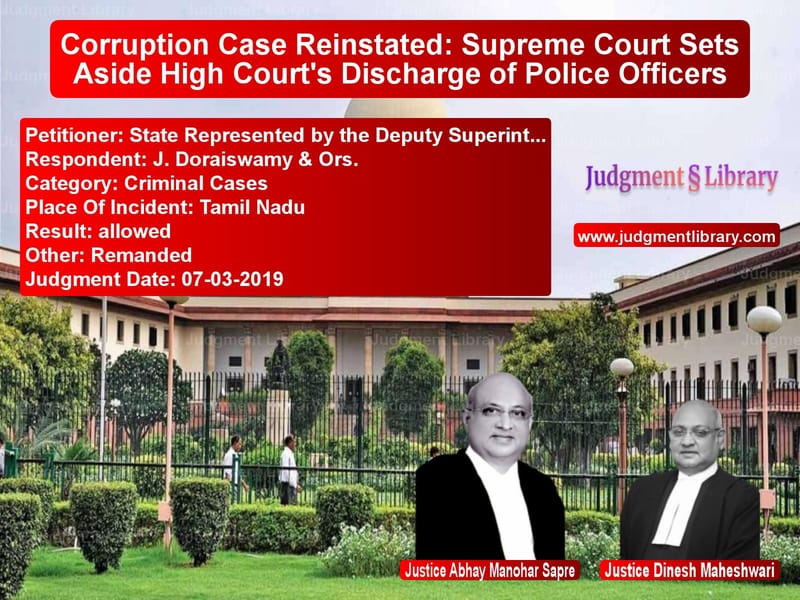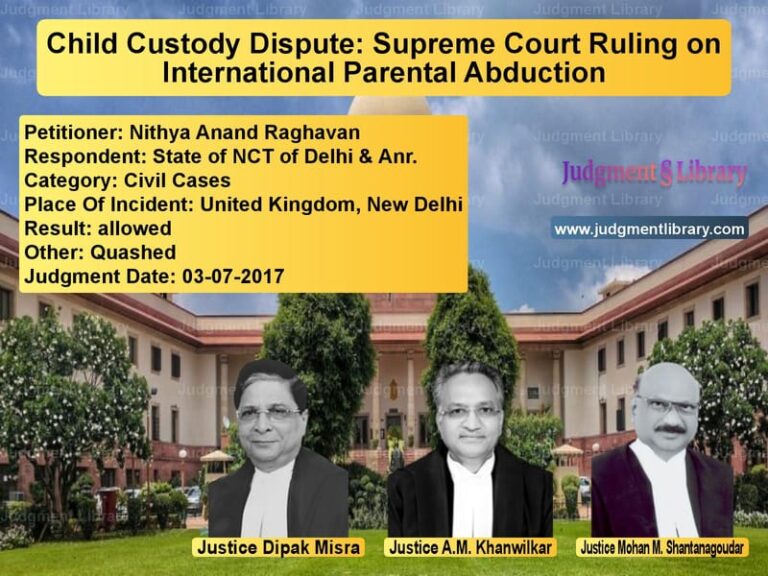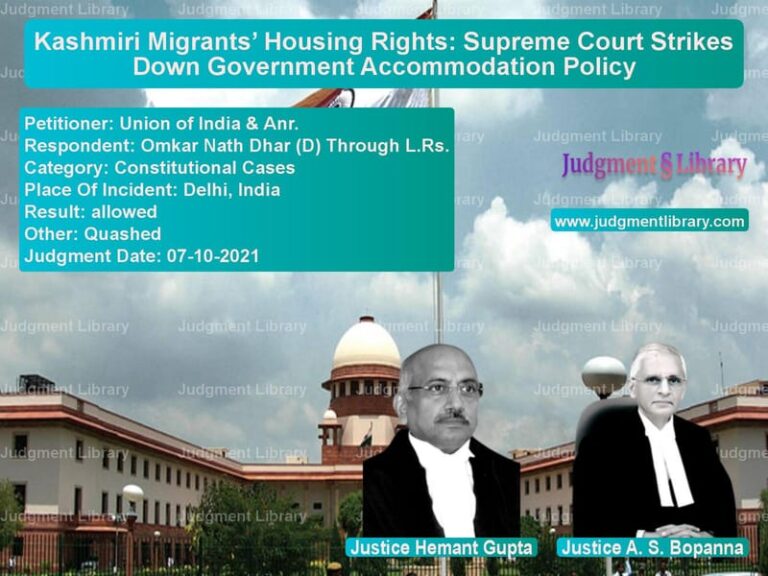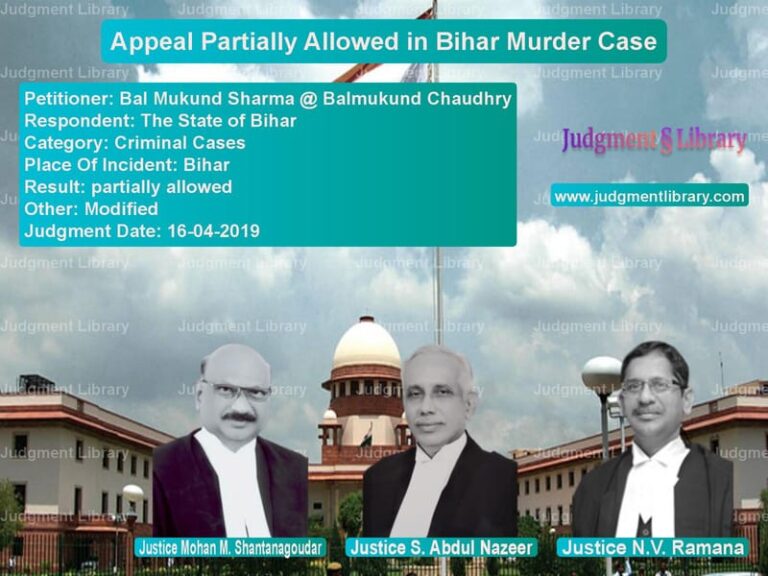Corruption Case Reinstated: Supreme Court Sets Aside High Court’s Discharge of Police Officers
The case of State Represented by the Deputy Superintendent of Police, Vigilance and Anti-Corruption, Tamil Nadu v. J. Doraiswamy & Ors. deals with serious allegations of corruption against two police officers. The Supreme Court, in its judgment dated March 7, 2019, ruled that the High Court had erroneously discharged the accused and reinstated the trial proceedings.
The case is significant as it highlights the importance of proper judicial scrutiny at the stage of framing charges and the role of courts in ensuring that corruption cases are not prematurely dismissed.
Case Background
The respondents, J. Doraiswamy (Inspector of Police) and another officer, were accused of demanding and accepting bribes while serving in the Tamil Nadu Police Service. They were charged under Section 7 read with Section 13(1)(d) of the Prevention of Corruption Act, 1988.
The prosecution alleged that they had demanded and accepted a bribe of Rs. 5 lakhs from the complainant. A trap was laid, and evidence was collected to support the allegations. The charge sheet was filed, and sanction for prosecution was obtained.
The accused officers filed discharge applications under Section 227 of the Criminal Procedure Code (CrPC) before the Special Judge/Chief Judicial Magistrate (CJM), Tiruvannamalai, seeking to be discharged from the case.
The CJM, by order dated June 29, 2015, allowed the discharge applications, stating that no prima facie case was made out against the accused.
The state prosecution agency challenged this order before the Madras High Court, which dismissed the revision petitions and upheld the discharge order.
The state, aggrieved by the High Court’s decision, filed an appeal before the Supreme Court.
Petitioner’s Arguments
The state, represented by Advocate S. Partha Sarathi, argued that:
- The High Court had failed to properly apply the legal principles governing the discharge of accused persons.
- There was sufficient material in the charge sheet to proceed with the trial.
- The trial court had acted as an appellate court and scrutinized the evidence in a manner not permitted at the stage of framing charges.
- The evidence of the complainant and witnesses clearly established a prima facie case.
Respondent’s Arguments
The accused officers, represented by Senior Advocate Neeraj Jain and Advocate S. Thananjayan, countered these claims with the following arguments:
- The charge sheet did not provide conclusive proof of their involvement.
- There were inconsistencies in the witness statements.
- The departmental inquiry had not found them guilty, and thus, the criminal case should not proceed.
- The prosecution had not presented any documentary evidence to prove that the alleged bribe was actually paid.
Supreme Court’s Observations and Ruling
The Supreme Court strongly criticized the approach taken by the High Court and the trial court in allowing the discharge. It observed:
“The High Court acted like an appellate court rather than as a revisional court, as if it was hearing the appeal against the final verdict of the Special Court.”
The Court reiterated that at the stage of discharge, the trial court was only required to see if a prima facie case existed and not to conduct a detailed evaluation of the evidence.
Referring to its earlier ruling in Yogesh alias Sachin Jagdish Joshi v. State of Maharashtra, the Court stated:
“While considering the case of discharge, the court cannot become an appellate court and start appreciating the evidence by finding out inconsistencies in the statements of witnesses.”
The Court pointed out that the High Court had erred in applying a higher standard of proof at the stage of discharge:
“All that is required is a prima facie case to proceed with the trial. The High Court ignored this and instead conducted a detailed scrutiny of the evidence, which was unwarranted.”
The Supreme Court ruled that:
“There is a prima facie case made out for trial. The respondents (accused) must face the trial in the light of the documents and contents of the charge sheet filed pursuant to the order of the court.”
Consequently, the Court set aside the High Court’s order and reinstated the trial proceedings.
Conclusion
This judgment serves as a crucial precedent reinforcing the principles governing discharge applications under the CrPC. The key takeaways from this case include:
- At the stage of framing charges, courts should only assess whether a prima facie case exists, not conduct a full-fledged trial.
- High Courts should exercise caution in revisional jurisdiction and should not act as appellate courts.
- Corruption cases must be scrutinized with utmost seriousness, and procedural errors should not allow accused persons to escape trial.
- Discharge applications should not be allowed merely because of minor inconsistencies in witness statements.
By reinstating the trial, the Supreme Court upheld the principles of accountability and transparency in corruption cases, ensuring that justice is not derailed due to procedural misinterpretations.
Petitioner Name: State Represented by the Deputy Superintendent of Police, Vigilance and Anti-Corruption, Tamil Nadu.Respondent Name: J. Doraiswamy & Ors..Judgment By: Justice Abhay Manohar Sapre, Justice Dinesh Maheshwari.Place Of Incident: Tamil Nadu.Judgment Date: 07-03-2019.
Don’t miss out on the full details! Download the complete judgment in PDF format below and gain valuable insights instantly!
Download Judgment: State Represented by vs J. Doraiswamy & Ors. Supreme Court of India Judgment Dated 07-03-2019.pdf
Direct Downlaod Judgment: Direct downlaod this Judgment
See all petitions in Fraud and Forgery
See all petitions in Money Laundering Cases
See all petitions in Custodial Deaths and Police Misconduct
See all petitions in Extortion and Blackmail
See all petitions in Judgment by Abhay Manohar Sapre
See all petitions in Judgment by Dinesh Maheshwari
See all petitions in allowed
See all petitions in Remanded
See all petitions in supreme court of India judgments March 2019
See all petitions in 2019 judgments
See all posts in Criminal Cases Category
See all allowed petitions in Criminal Cases Category
See all Dismissed petitions in Criminal Cases Category
See all partially allowed petitions in Criminal Cases Category







